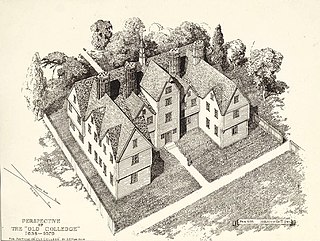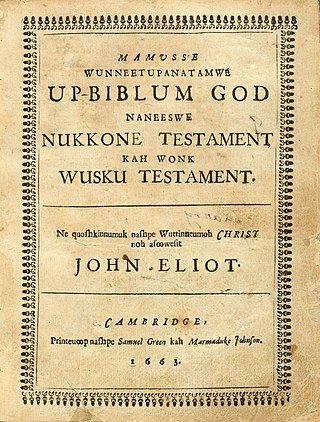Related Research Articles

John Harvard (1607–1638) was an English Puritan minister in Colonial New England whose deathbed bequest to the "schoale or colledge" founded two years earlier by the Massachusetts Bay Colony was so gratefully received that the colony consequently ordered "that the Colledge agreed upon formerly to be built at Cambridge shalbee called Harvard Colledge".

Theophilus Eaton was a wealthy New England Puritan merchant, diplomat and financier, who took part in organizing and financing the Great Puritan Migration to America. He was a founder of Massachusetts Bay Colony, and a founder and eventual governor of New Haven Colony. He also cofounded Boston, Massachusetts, Greenwich, Connecticut and Eaton's Neck in New York.

Nathaniel Eaton was an Anglican clergyman who was the first Headmaster of Harvard, President designate, and builder of Harvard's first College, Yard, and Library, in 1636.

The “Oath of a Freeman” was a loyalty pledge required of all new members of the Massachusetts Bay Colony in the 1630s. Printed as a broadside by Stephen Daye in 1639, it is the first document from a printing press known to have been produced in the present day United States. No copies are known to exist, but the text is known from a handwritten copy and two books, New-England’s Jonas Cast Up at London (1647) and Massachusetts’s General Lawes and Libertyes (1648).

George Parker Winship was an American librarian, author, teacher, and bibliographer born in Bridgewater, Massachusetts. He graduated from Harvard in 1893.

Stephen Daye Sr. emigrated from England to the British colony of Massachusetts and became the first printer in colonial America, under indenture to Elizabeth Glover, owner of the first printing press in the British Colonies. He printed the Bay Psalm Book in 1640, the first book known to have been printed in the present day United States.

Peter Bulkley was an influential early Puritan minister who left England for greater religious freedom in the American colony of Massachusetts. He was a founder of Concord, and was named by descendant Ralph Waldo Emerson in his poem about Concord, "Hamatreya".
Ezekiel Rogers 1590 – January 23, 1660) was an English nonconformist clergyman, and Puritan settler of Massachusetts.

Samuel Green was an early American printer, the first of several printers from the Green family who followed in his footsteps. One of Green's major accomplishments as a printer was the Eliot Indian Bible, translated by the missionary John Eliot, typeset by James Printer, which became the first Bible to be printed in British America in 1663. Members of his family who also became printers include his sons Bartholomew, Bartholomew Green Jr. and Joseph Dennie. Throughout his adult life Green also served in the Massachusetts Bay Colonial Militia, advancing to the rank of captain later in life.

John Langdon Sibley was the librarian of Harvard University from 1856 to 1877.

John Foster was an early American engraver and printer who lived in Boston in the Massachusetts Bay Colony when the colony was still in its infancy. He is credited with producing the first printed image in British colonial America, from a woodcut of the Puritan minister Richard Mather. He also printed the first map to appear in the colonies. Foster graduated from Harvard University, but was a self-taught pioneer in American printmaking in woodcut, and also learned the art of typography from the Boston printer Marmaduke Johnson. He subsequently printed many works by prominent religious figures of the day in Massachusetts, and for a few years printed and published an annual almanac. His woodcuts were also used for the printing of official seals of the Massachusetts Bay Colony used by the provincial government.

The Eliot Indian Bible was the first translation of the Christian Bible into an indigenous American language, as well as the first Bible published in British North America. It was prepared by English Puritan missionary John Eliot by translating the Geneva Bible into the Massachusett language. Printed in Cambridge, Massachusetts, the work first appeared in 1661 with only the New Testament. An edition including all 66 books of both the Old and New Testaments was printed in 1663.
The John of London was a ship famous for bringing the first printing press to the British Colonies of North America; however, the first press in the American continent had arrived in 1536 in Mexico City by Juan Pablos in representation of Juan Cromberger.
Elijah Corlet was schoolmaster of the Cambridge Grammar School in Cambridge, Massachusetts for most of the late 17th century. Many of his pupils were early students of Harvard College, including the minister Cotton Mather. From 1672 to 1700, the Cambridge Grammar School sent more students to Harvard than any other school.
Elizabeth Glover was responsible for bringing the first printing press to the Thirteen Colonies. She established a press in Cambridge, Massachusetts, where she printed Oath of a Freeman, An Almenack, and the Bay Psalm Book with the help of printer Stephen Daye. She married Henry Dunster, first president of Harvard University. After Glover's death, the printing press was gifted to Harvard.

Early American publishers and printers played a central role in the social, religious, political and commercial development of the Thirteen Colonies in British America prior to and during the American Revolution and the ensuing American Revolutionary War that established American independence.

Bibliography of early American publishers and printers is a selection of books, journals and other publications devoted to these topics covering their careers and other activities before, during and after the American Revolution. Various works that are not primarily devoted to those topics, but whose content devotes itself to them in significant measure, are sometimes included here also. Works about Benjamin Franklin, a famous printer and publisher, among other things, are too numerous to list in this bibliography, can be found at Bibliography of Benjamin Franklin, and are generally not included here unless they are intensely devoted to Franklin's printing career. Single accounts of printers and publishers that occur in encyclopedia articles are not included here.
Marmaduke Johnson was a London printer who was commissioned and sailed from England to Massachusetts Bay Colony in 1660 to assist Samuel Green in the printing of The Indian Bible, which had been laboriously translated by John Eliot into the Massachusett Indian language, which became the first Bible printed in America. Johnson is considered the first master printer to emerge in America. When he attempted to operate his own privately owned printing house in Boston, without an official license from the Crown, the Massachusetts General Court interceded and censured his operation, which in turn started one of the first 'Freedom of the Press' issues in colonial America. After several appeals the Court conceded, where Johnson moved to Boston, set up and outfitted his printing shop, and ultimately became the first printer in America allowed to operate his own private printing press. During his printing career, Johnson printed several works for Eliot containing religious material translated for the Indian nations of Massachusetts.

Captain Thomas Yale was a British military officer, merchant and magistrate. He was a puritan who emigrated from London to the New England Colonies aboard the Hector in 1637, and cofounded, with his stepfather, Governor Theophilus Eaton, the colony of New Haven. He was also a deputy to the Connecticut General Assembly and fought in King Philip's War.
References
- ↑ Littlefield, George Emery (1907). The Early Massachusetts Press, 1638-1711. Club of Odd Volumes. p. 26.
- 1 2 3 Shipton, Clifford Kenyon; Sibley, John Langdon (1873). Sibley's Harvard Graduates Biographical Sketches of Those who Attended Harvard College - 1642-1658. Massachusetts Historical Society. p. 208-9.
- ↑ Columbia Encyclopedia 6th Edition. New York City: Columbia University Press. 2000. p. 1139. ISBN 0787650153. Online article at Encyclopedia.com
- ↑ Proceedings of the American Antiquarian Society, Volumes 62–69. American Antiquarian Society. 1874. p. 9.
- ↑ Barden, Cindy (2001). Life in the Colonies, Grades 4 - 7. Mark Twain Media. p. 46. ISBN 9781580371759.
- ↑ Hruschka, John (2015). How Books Came to America - The Rise of the American Book Trade. Penn State University Press. p. 30. ISBN 9780271068381.
- ↑ "Stephen Day". Encyclopedia Britannica. Retrieved 29 October 2022.